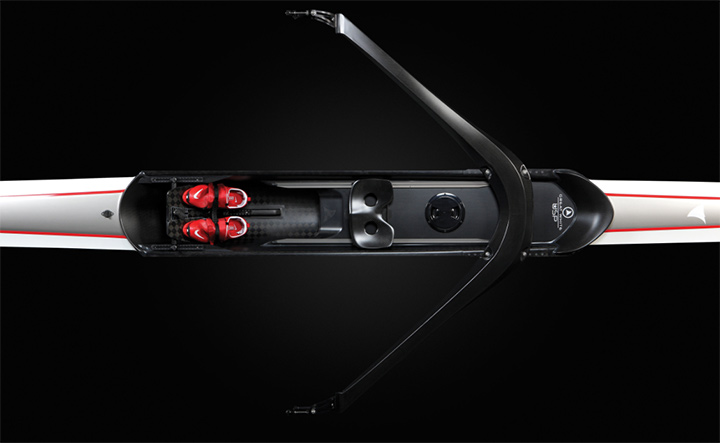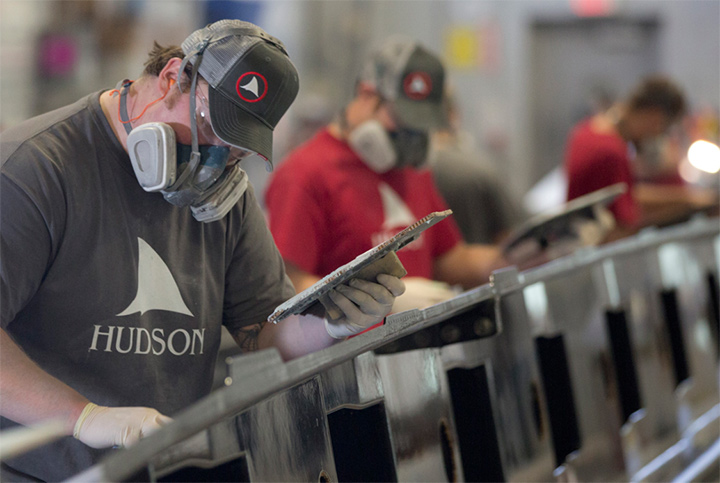HUDSON Boat Works rides wave of success in global markets

When you’re a competitive rower gliding through the water at international competitions like the 2019 Pan American Games in Lima, Peru, every stroke counts. Even a fraction of a second can make the difference between winning a medal and missing the podium.
This is why London, Ontario’s HUDSON Boat Works is constantly looking for ways to give athletes an edge. The 90‑employee‑strong manufacturer of elite racing shells has a reputation for setting the pace.
“We are at the pointy end of the sport,” says Operations Manager Glen Burston.
Athletes have committed a decade of their life to training and the equipment has to be highly reliable and customizable. That’s the nature of rowing.

Burston says HUDSON’s focus on innovation, technology and engineering has put the company on the podium as one of the top three racing‑shell manufacturers in the world.
But like every success story in sport, there were challenges to surmount along the way. HUDSON co-founder Jack Coughlan learned early on that staying on the cutting edge of technological advances was crucial in business.
“His first company made wooden oars, but then a U.S. company obliterated that market with carbon fibre,” explains Burston. “His feet were swept out from underneath him by a technological change he didn’t see coming.”
Coughlan went on to launch HUDSON Boat Works in 1981 with a determined focus on making cutting‑edge, competition‑level rowing shells. Burston attributes a big part of the company’s success to the skills and creativity of its manufacturing team.
“While HUDSON had a humble start in a basement, now we use lasers in the ceiling to build customized state‑of‑the‑art boats from the same carbon fibre as a space shuttle. Our manufacturing system is completely integrated.”
HUDSON boats have won more than 88 medals at the Olympics and World Rowing Championships, and were used to set a world record in the Men’s Eight event at the 2004 Athens Olympics. Every time a boat wins, athletes and coaches take note of the brand.
With 85% of their boats headed for international waters, exporting the product keeps the company riding the wave of success, says Burston.

“For us, the support from the government and Trade Commissioner Service has gone a long way towards keeping our investment here while we diversify into other countries. It’s a nice spot to be in, exporting half of total production to the U.S. But we also have significant overseas exports to the U.K., Europe, Australia, New Zealand and a number of other countries.”
Burston says Canada’s recent trade agreements with Europe, the Comprehensive Economic and Trade Agreement (CETA), and with the Asia-Pacific region, the Comprehensive and Progressive Agreement for Trans-Pacific Partnership (CPTPP), also help.
“The European trade deal CETA was incredible,” he says. “It levelled the playing field, made us much more competitive and took away barriers.”
“On the Pacific side, the CPTPP effectively lowers our tariffs with Australia and New Zealand by 5%. That makes us virtually competitive with domestic builders there, which is an incredible leg up for us.”
Federal support through programs such as CanExport has also gone a long way towards helping HUDSON keep an even keel.
“CanExport is a great program. We actually have a big push into South America. CanExport helped us with a small grant, which covers a significant portion of travel costs. These are not huge numbers, but they open doors and let us say ‘let’s take a chance on this.’”
- Date Modified: